LUTHIER
JOSEP MELO,
Guitars with a Personality
By: M.A.
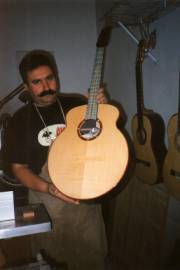 No doubt art is found not only in music, but also
in the instruments that play this music. Without them, music
could not exist, and besides this fact, the personality of each
instrument also has an influence on that of the music played with
them. Unlike the mass produced instruments, those that are
handmade by luthiers possess a unique, inimitable personality,
which enriches the compositions where they are used.
No doubt art is found not only in music, but also
in the instruments that play this music. Without them, music
could not exist, and besides this fact, the personality of each
instrument also has an influence on that of the music played with
them. Unlike the mass produced instruments, those that are
handmade by luthiers possess a unique, inimitable personality,
which enriches the compositions where they are used.
Amongst those luthiers specialized in
guitars, Josep Melo
is a clear example of a craftsman who does not allow his art to
be influenced by fashions, who keeps himself apart from
conventionalisms so as to experiment with new ideas, and whose
instruments succeed in achieving a unique personality that makes
them stand out from any others.
Attracted by music from an early age,
the guitar immediately became his favourite instrument. Besides
playing it and collecting them, he became interested in the
secrets that determine their sonic texture. He befriended such
worldwide famous luthiers as Jim D'Aquisto, Jean Pierre
Favino, David John Morse and Josť Luis Romanillos,
from whose experiences he deduced valuable conclusions. He
visited several guitar factories, such as Gibson's
in Nashville, Bozeman's in Montana and that of Martin
& Co in Pennsylvania. His formation as a designer,
as well as his studies on the physics of sound, allowed him to
engage into the manufacturing of guitars with a high scientific
knowledge quite unfrequent among luthiers. Joining this technical
basis to his personal ideas, he has succeeded in creating an
attractive brand of acoustic, classical and electronic guitars,
whose characteristics can turn out to be very surprising indeed.
For instance, his electric guitars have a sonority quite similar
to that of an acoustic one.
Josep Melo has given us an
interview in his workshop, where the scope and the thoroughness
of his work can be fully appreciated.
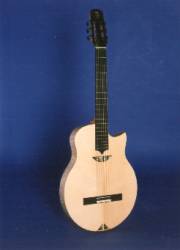 -Is the making of a guitar more an art or a technique?
-Is the making of a guitar more an art or a technique?
"Well, this is a somewhat difficult question to
answer. To build a guitar, one needs to know how to be a
carpenter, since it is necessary to work the wood with the
sufficient skills. Also one must know as best as possible the
properties of the materials one works with. For a carpenter,
many of the aspects of the way one works the wood and the
placing of the elements on a structure have little
importance. But unlike what happens with furniture, in a
musical instrument the correct use of the material is basic,
and so is the selection of the correct material for each
purpose. As is obvious, one must know all the technical
characteristics of the instrument that must be made, and it
is desirable to have a solid formation in the physics of
sound".
-You work both with acoustic and electric
guitars. Aren't these very different kinds and perhaps with
opposed philosophies? Do you find any rivalry between both types
and that those who are in favour of one or the other display
conflicting attitudes?
"No. Some years ago, perhaps it was true that
there was a barrier between folk musicians with their
acoustic guitars and those who chose rock with their electric
guitars. But today this no longer happens, especially with
those guitar players that do not come from Classical Music.
These are very versatile musicians, who may very well play an
acoustic or an electric guitar. Those who intend to keep both
classes apart still tend to be the classical musicians. It's
difficult to have them use an electric guitar to perform.
They are orthodox even in the characteristics that the
acoustic instrument must have: certain predetermined
measures, a given shape... The modern musician is more
versatile, accepts a greater number of designs, and even
dares try new philosophies of sound. On the other hand, it
must be said that several modern guitarists, even some of a
proven professionalism, do not take adequate care of the
aspect of sound. It happens to be quite astonishing that a
guitarist with a great performing technique uses the guitar
of an amateur. Being a luthier who intends to make a sound
which is different from others as well as introduce new
qualities, it is quite frustrating for me when the musician
who comes to see me cannot appreciate such things out of his
own ignorance on the generic sonic characteristics of the
guitar".
-What do you think about the electronic
processing devices for acoustic instruments, and especially for
guitars?
"In the case of the acoustic guitar I think that
it has to have its sonic qualities by itself, and in any case
the only conversion I gladly accept is amplification by means
of the piezopassive system, whose only function is to turn
the vibration of the string and the cover to electronic
signals that are later amplified, so that the tonal quality,
and above all, the dynamics of the instrument, are not
modified. In my opinion, the great problem of the acoustic
guitar amplified with a signal frequency amplifier is the
fact that it decreases or increases the frequencies. It is as
if they were all placed within a central track, ignoring the
extreme margins, which precisely are the most representative
trait in the personality of the acoustic instruments. The
best they can offer in sound is their great amount of
dynamics. What a signal frequency amplifier does is to
equalize these dynamics so as to redirect them all into some
sort of track that the amplifier can accept better, therefore
the signal is more equalized and easier to process. I prefer
the guitar with passive electronics, so that in this way the
original sound is not modified. In this way, everything you
play reaches the amplifier intact. As for the electric
guitar, something very similar happens here, and the sound
can turn out to be "artificial", although I know
that this is difficult to understand if you don't listen to
it. In spite of its not being a purely acoustic instrument, I
believe that the electric guitar can also give 'natural' and
precise sounds. So, if in its amplification active systems
are used, the genuine sonority is lost".
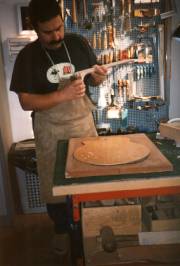
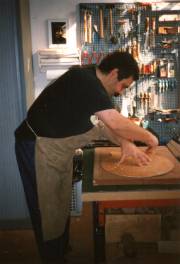
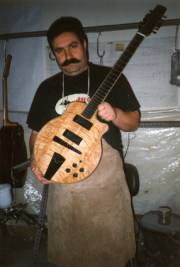
 Previous Page (Articles/News)
Previous Page (Articles/News)
 No doubt art is found not only in music, but also
in the instruments that play this music. Without them, music
could not exist, and besides this fact, the personality of each
instrument also has an influence on that of the music played with
them. Unlike the mass produced instruments, those that are
handmade by luthiers possess a unique, inimitable personality,
which enriches the compositions where they are used.
No doubt art is found not only in music, but also
in the instruments that play this music. Without them, music
could not exist, and besides this fact, the personality of each
instrument also has an influence on that of the music played with
them. Unlike the mass produced instruments, those that are
handmade by luthiers possess a unique, inimitable personality,
which enriches the compositions where they are used. -Is the making of a guitar more an art or a technique?
-Is the making of a guitar more an art or a technique?

